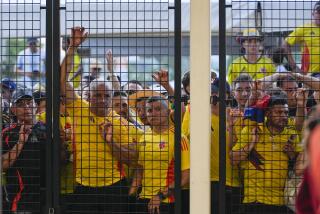Coming ‘tsunami’? In Brazil, calls for reform in wake of FIFA scandals
- Share via
Reporting from Rio de Janeiro — Government officials and top former players are calling for corruption investigations and reform of soccer in Brazil following the indictment of high-ranking FIFA officials including Jose Maria Marin, former president of the Brazilian Football Confederation.
Marin, who presided over last year’s World Cup tournament in Brazil, was among the international figures recently arrested in Switzerland; retired star striker Ronaldo Luis Nazario de Lima, known simply as Ronaldo, has been one of many to call for Marin’s successor, Marco Polo del Nero, to resign.
Romario de Souza Faria, a former FIFA World Player of the Year who is now a Brazilian senator, called for an official congressional investigation of soccer in Brazil. Other lawmakers have thrown their support behind a probe, providing the necessary signatures for the inquiry to begin as soon as next week.
Romario, as he is known in Brazil, summed up the mood in Brazil after FIFA President Sepp Blatter resigned last week, days after being reelected. “All the corrupt leaders of [soccer] confederations will feel his fall in the form a tsunami,” Romario wrote in posts on several social network sites. “I hope the waters of this great wave are high enough to wash away all the corruption.”
Brazil is the only country to have won five World Cups, and soccer has long played a key role in the country’s economy and culture. Leaders of its local organizations have long been suspected of wrongdoing -- yet have managed to maintain control.
Since 2012, a video that appears to show Marin pocketing one of the medals he was handing out to youth players has served to demonstrate the brazen nature of the problem here. At the time, Marin responded that the medal was a gift to him from the Brazilian Football Confederation, or CBF.
Brazilian President Dilma Rousseff said this week that she supported investigations of corruption in soccer. However, she added that no one in her nation had a motive to bribe FIFA officials in order to win the right to host the 2014 World Cup, as has been suspected in the cases of the 2018 and 2022 tournaments planned for Russia and Qatar. Brazil was the only country to officially offer to host the 2014 tournament.
That event was considered a moderate organizational success for Brazil, despite the host team’s lackluster fourth-place finish. But the new stadiums for the 12 host cities, most built at great cost by local construction companies, generated widespread protests here over wasteful spending, and some have barely been used since the World Cup ended last summer.
As well, several stadium construction companies have recently come under investigation for involvement in a corruption scandal tied to Brazil’s state-controlled oil company, Petrobras.
“The arrest of [Marin] could open the door for all the changes that the sport here needs,” said Amir Somoggi, a sports management consultant in Brazil. “The sport hasn’t been growing or developing as an industry as a result of the problems of corruption.”
Despite the huge popularity of soccer, average attendance at Brazil league matches has been lower than corresponding matches in the U.S. Critics of the current system also point to problems with management and club debt.
Del Nero, Marin’s successor, has said he will not resign, but would accept small changes in the way the CBF is run.
Blatter succeeded Brazilian Joao Havelange, who ran FIFA from 1974 to 1988. According to several media outlets in Brazil, the FBI is now investigating links between FIFA General Secretary Jerome Valcke and former CBF chief Ricardo Teixeira, who left the post and moved to Miami in 2012. At the time, allegations swirled that Teixeira took bribes, along with his former father-in-law, Havelange, related to World Cup marketing rights. No criminal charges have been filed, but a FIFA ethics report said “it is certain” they both took bribes.
“For those that want to change the way Brazilian football is governed, this international crisis for FIFA could not have come at a better time,” said Juca Kfouri, a well-known Brazilian sports commentator. “Up until now, the ability of dirty officials in Brazilian soccer to survive has been unending.”
Bevins is a special correspondent.
More to Read
Sign up for Essential California
The most important California stories and recommendations in your inbox every morning.
You may occasionally receive promotional content from the Los Angeles Times.











